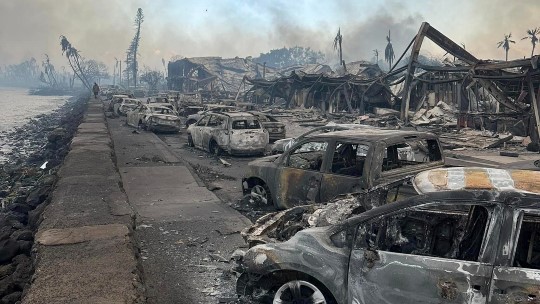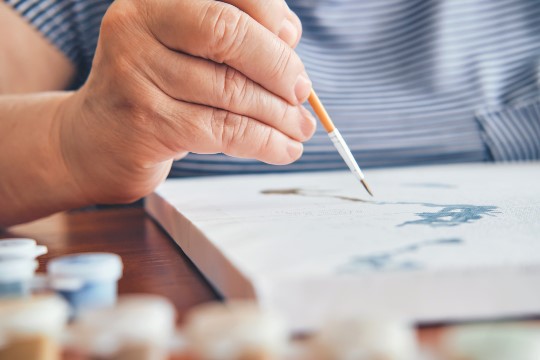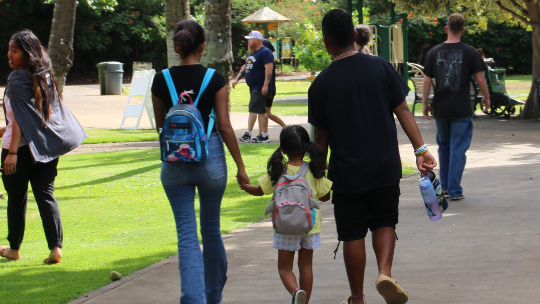While the physical destruction caused by the Maui wildfires was devastating, it’s important not to neglect the negative effects on mental health this unprecedented event has had. We talked to James Westphal, M.D., psychiatrist and consulting mental health medical director to HMSA from Carelon Behavioral HealthSM, to learn more about behavioral health resources and ways to take care of yourself and your loved ones.
Understanding trauma
The American Psychological Association describes trauma as an emotional response to a terrible event including a natural disaster. “About 40% of people exposed to a significant trauma like the wildfires will develop long-lasting mental health symptoms within a year,” Dr. Westphal says.
Feelings like shock and denial are commonly experienced after a traumatic event. Longer-term reactions can include unpredictable emotions, flashbacks, strained relationships, and physical symptoms such as headaches or nausea. Though these feelings are to be expected, some people have a hard time moving forward. “If a person who has experienced trauma receives mental health treatment in the immediate days or weeks after the trauma,” Dr. Westphal says, “it can significantly reduce the trauma’s long-lasting effects.”
The impact of the Maui wildfires
The Pacific Disaster Center and the Federal Emergency Management Agency estimate that more than 2,200 buildings were destroyed in Lahaina causing nearly $6 billion in damage. “The Maui wildfires were a mass trauma event,” Dr. Westphal says, “directly affecting the survivors, especially the injured, the people who lost their homes and businesses, the people who lost family members and have family members missing, and those who witnessed the fires.”

The devastation in Lahaina from the wildfires. Photo courtesy Rae Enzo.
Start small
It may be overwhelming to know where to start when it comes to taking care of yourself. Here are some suggestions from Dr. Westphal:
- Get enough rest. Schedule seven to eight hours of sleep a night. Sleep deprivation (less than seven hours) can impair your concentration, decision making, memory, and judgment. It can also cause or exacerbate depressive symptoms. If you’re having a hard time falling or staying asleep due to overthinking, it’s a good idea to seek help.
- Stay active. Incorporate daily aerobic exercise into your routine. Even walking 20 minutes a day can be beneficial.
- Breathe. This may seem obvious, but deep, slow breathing is good for you. It encourages full oxygen exchange and can slow heart rate and lower or stabilize blood pressure. Practice deep breathing daily before bed and when you feel overwhelmed.
- Focus on the positive. With all the stress that comes with experiencing a traumatic event, it may seem difficult to think positively. However, focusing on the positive can lower rates of depression, distress, and pain. Do a daily positive emotion exercise such as a gratitude journal.

Not getting enough sleep could impair your concentration, memory, and judgment.
How to help
If someone you know was affected by the wildfires, you may feel like you don’t know how to help. Dr. Westphal suggests just listening to them. “If they want to talk, listening helps validate their experience,” he says. “Consider statements that convey empathy such as, ‘If I had been in that situation, I would have been scared and overwhelmed, too.’”
If the person doesn’t want to talk, it’s best not to force them. “Sometimes talking about the disaster could cause retraumatization or reexperiencing symptoms for some,” Dr. Westphal says. “If that’s the case, there are other ways to process the experience and begin to heal.” A recent study found that writing about trauma such as in a journal can benefit as much as talking about it. Other artistic expressions like drawing and painting can also be beneficial to those in recovery.

Art can be therapeutic.
Also, hugging or holding someone provides them with nonverbal support. “Remind yourself that your friend or family member has been traumatized and express positive feelings to them more often than you would usually,” Dr. Westphal says. “A little patience and kindness can go a long way.”
Resources
Help and support are available. Reaching out is an important step in starting the journey to recovery.
Carelon Behavioral Health
HMSA’s partner is offering free grief support to anyone affected by the wildfires on Maui. Carelon Behavioral Health staff members are available 24/7 to listen to concerns and help solve problems during this challenging time. Staff members will help callers manage their stress and help them determine next steps to take to care for themselves and their families. People in need can call the dedicated support line at 1-800-580-6934.
Hawaii CARES 988
Call or text 988 or chat with a crisis counselor if you need mental health, substance use, or suicide prevention support.
Hawaii Department of Health, Maui Community Mental Health Center
The Department of Health is offering crisis mental health services and expanded hours for those experiencing emotional or psychological distress. Services include:
- Trauma processing
- Psychiatric services
- Resources guidance
Call 808-984-2150, email mauiwellness@doh.hawaii.gov, or go to 121 Mahalani St. in Wailuku, Monday-Friday, 7:45 a.m.–4:30 p.m.
Hawaii Department of Health, West Maui Coordinated Care Clinic
The Lahaina Health Center provides general medical care, prescription refills, and mental health services. No appointment necessary and insurance not required. Mobile visits are also available, covering neighborhoods from Leialii to Honokohau Valley. Open seven days a week, 8 a.m.–5 p.m. Call 1-833-833-3431 or 808-586-4468. Or go to Akoakoa Place below the Lahaina Civic Center.
Substance Abuse and Mental Health Services Administration
The Disaster Distress Helpline is dedicated to providing year-round disaster crisis counseling. This toll-free crisis support service is available 24/7 to all residents in the U.S. experiencing emotional distress related to natural or human-caused disasters. Call or text
1-800-985-5990.
Carelon Behavioral HealthSM is an independent company providing behavioral health utilization management and quality improvement services on behalf of HMSA.




